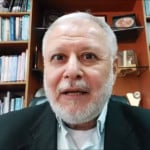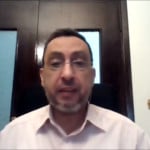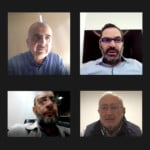Al-Zaytouna Centre for Studies and Consultations held on 17/11/2021 a webinar to discuss the Lebanese difficult circumstances threatening its political and social stability, where a selected group of experts, specialists and those interested in the Lebanese issue participated.
Moderated by Prof. Dr. Mohsen Mohammad Saleh, the General Manager of al-Zaytouna Centre, the webinar started with Dr. Imad Hout, who presented his policy paper, “The Lebanese Crisis: Forecasts and Pathways,” to the participants. He reviewed the main determinants of the Lebanese scene, such as the country’s hybrid sectarian structure, its fragile economic structure and the confusing political conditions.
Hout reviewed the most important possible risks and scenarios, including the UN Security Council would issue a resolution imposing international administration of Lebanon, or an Israeli war would be launched against Lebanon to disarm Hizbullah. He also mentioned other scenarios, such as the advancement of US-Iranian negotiations, which would help reach political settlements in Lebanon; and the increase of US pressures on Lebanon through further financial restrictions, to weaken the Lebanese chip being used by Iranian negotiators.
Hout said that the likely scenario is the continuation of the status quo, with further economic and security deterioration, with some mitigatory measures to prevent full collapse. At the same time, the US administration would continue to seek to alter the political balance of power through the upcoming legislative election, and mobilize the public opinion against Hizbullah’s practices, while pushing towards demarcating the southern maritime borders. All this pending the advancement of the nuclear negotiations towards reaching a deal on the nuclear program of Iran and its role in the region, including Hizbullah’s role in Lebanon, which could help produce political settlements in Lebanon and other countries in the region.
He considered the pathways of the solutions are also multiple and branched, covering politics, economy and reform. Politically, he suggested that it would be more expedient to adopt a constitutional path, thus changing through legislative elections that redistributes power through the ballot boxes, and to form a reformist bloc from outside the traditional party alignments or foreign allegiances. Next a president is elected from outside the traditional class who would inspire the electorate and restore their confidence in the state, accountable to the citizenry.
Economically, Hout said that a plan to tackle the economic crisis must be put in place on two parallel tracks: the resilience track, where a set of financial incentives, and economic, monetary, and social measures would be taken; and the economic recovery track, by recovering stolen funds, reconsidering economic policies away from rentier models to productive models, stopping wastage and reducing the budget deficit.
Reform wise, Hout considered radical solutions are necessary, such as taking radical measures at the level of the independence of the judiciary, activating the national anti-corruption commission and other oversight and regulatory boards, enforcing freedom of access to information laws, lifting banking secrecy on residents of Lebanon, auditing the central bank and ministries’ accounts, and reformulating the role of the banking sector to become creditors of the productive economy while keeping clear of interest rates policies that have drained the public coffers.
The paper concluded that the true solution must come at home, with the ruling class abandoning the idea of quota power sharing, as this hinders meritocracy in governance. Only then will it be possible to work professionally to save Lebanon, which has been exhausted by the conflict of powers and interests between religious communities and the top leaders of the country.
Hout said that this may sound difficult but it is not impossible, given the popular support for the notion of a citizenship-based state that has no room for sectarian quota sharing. This could lead Lebanon towards multiple paths: the political and constitutional reconstruction of the state; real economic reform and recovery program; implementing radical reforms for good governance; and maintaining internal stability. Each pathway requires a working plan that must be compatible with the aspirations of the Lebanese, who are desperately awaiting salvation.
He called the Lebanese parties and forces, including the forces of the popular uprising, to adopt the language of open dialogue with all the others regarding fundamental issues, such as Lebanon’s identity, the fate of Taif, abolishing political sectarianism, Lebanon’s relations with its neighbourhood, the country’s defensive strategy, and the economic, social, and development policies for the future. He considered that agreeing on shared visions is the only way to build a real country, and the Lebanese have all the requirements of economic and political revival if their energies and wills become bound together, far from foreign pressures and influences, no matter their source.
The participants discussed the paper and the structural and identity crisis that Lebanon is facing. They wondered if change is feasible through legislative elections, adding that that there is the possibility of emergence of other scenarios, such as the revolutionary path or the violent path of change, which may distance the proposed reform path. They called for an internal dialogue between all Lebanese parties, away from regional quarrels, and suggested establishing a coalition that believes in citizenship and state institutions, and seek to form a critical bloc that would impose reform.
The panel discussion was concluded with Hout’s responses and clarifications to the questions and interventions of the participants. He said that, as long as it is available, the constitutional option of change must be chosen, as it would spare the country security turmoil or even civil war.
| Click here to download: Policy Paper: The Lebanese Crisis: Forecasts and Pathways … Dr. Imad Hout |
Al-Zaytouna Centre for Studies and Consultations, 18/11/2021








Leave A Comment